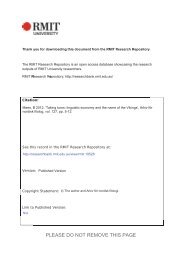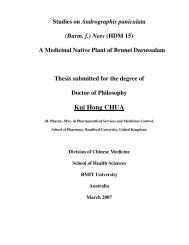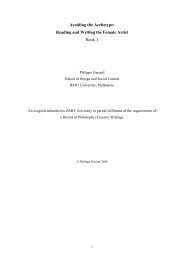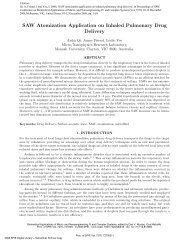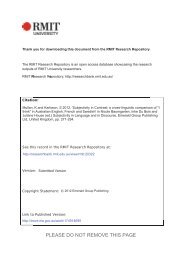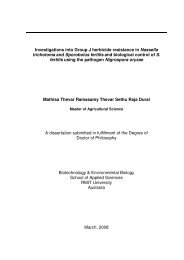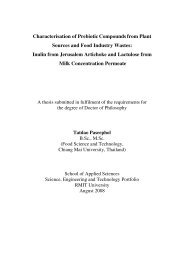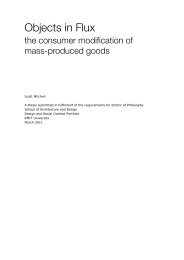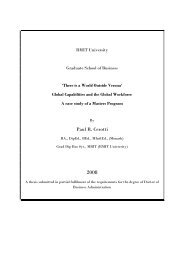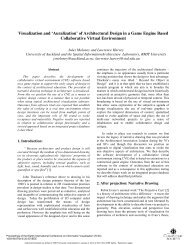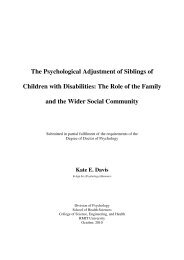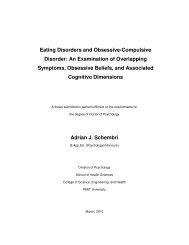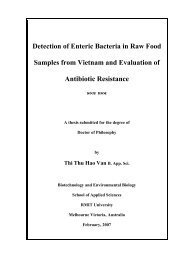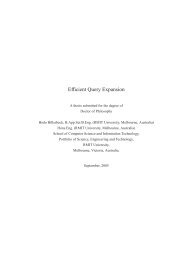Making Memory Space: Recollection and Reconciliation in Post ...
Making Memory Space: Recollection and Reconciliation in Post ...
Making Memory Space: Recollection and Reconciliation in Post ...
You also want an ePaper? Increase the reach of your titles
YUMPU automatically turns print PDFs into web optimized ePapers that Google loves.
Built form <strong>and</strong> the twilight of memory<br />
The assertion that built form can contribute to collective recollection <strong>and</strong> contemporary production of<br />
self-image is articulated by Robert Bevan who comments, ‘[A]rchitecture has become a proxy by<br />
which other ideological ethnic <strong>and</strong> nationalist battles are still be<strong>in</strong>g fought today.’ 19 This notion<br />
recognises the role that architecture can play <strong>in</strong> the ma<strong>in</strong>tenance <strong>and</strong> production of national<br />
narratives, which <strong>in</strong> turn give rise to the creation <strong>and</strong> establishment of national identity. Thus the<br />
conscious construction of museums <strong>and</strong> memorials <strong>in</strong> a society actively shap<strong>in</strong>g its national identity<br />
can contribute significantly to how that identity emerges. In this respect memory becomes a palpable<br />
entity <strong>in</strong> the present.<br />
The German theorist Andreas Huyssen identifies memory as a state of be<strong>in</strong>g: between liv<strong>in</strong>g the event<br />
<strong>and</strong> the act of recall<strong>in</strong>g it. He def<strong>in</strong>es this state as a ‘twilight’ exist<strong>in</strong>g <strong>in</strong> the nexus between the past<br />
<strong>and</strong> its recollection. Acknowledg<strong>in</strong>g this state renders memory a contemporary act dependent on a<br />
past that is understood <strong>and</strong> altered accord<strong>in</strong>g to perception, time <strong>and</strong> representation. 20 The act of<br />
<strong>in</strong>terpretation <strong>and</strong> translation that must occur between the recollection of a past event <strong>and</strong> its<br />
<strong>in</strong>carnation <strong>in</strong> physical form necessitates a mediated perspective on the past, the beg<strong>in</strong>n<strong>in</strong>g of the<br />
process of shap<strong>in</strong>g the recollection accord<strong>in</strong>g to social agendas, or political expediency. This thesis<br />
argues that it is the mechanisms of address<strong>in</strong>g this state of be<strong>in</strong>g that <strong>in</strong> many respects forms the<br />
basis for the production of memory space <strong>in</strong> South Africa. The country is held taut between<br />
recollections of the past, <strong>and</strong> its shadow <strong>in</strong> the present. The cont<strong>in</strong>ued existence of memory <strong>in</strong><br />
contemporary society forms the basis for collective memory <strong>in</strong> South Africa. Unlike other countries that<br />
have overturned a dictator, or overthrown a regime by violent means, the dismantl<strong>in</strong>g of Apartheid was<br />
peacefully negotiated between the government <strong>and</strong> the ANC. This situates the past <strong>and</strong> the usual<br />
characterisations of regime <strong>and</strong> accompany<strong>in</strong>g term<strong>in</strong>ology of ‘perpetrators’ <strong>and</strong> ‘victims’ <strong>in</strong> a differ<strong>in</strong>g<br />
light. The demise of Apartheid has not resulted <strong>in</strong> a radical change of lifestyle for much of the<br />
population. Although the period of Apartheid is described by def<strong>in</strong>itive historical dat<strong>in</strong>g it began <strong>in</strong><br />
essence long before it was codified <strong>and</strong> its ramifications cont<strong>in</strong>ue to be felt <strong>in</strong> the present day. 21<br />
Consequently, memories of trauma are well entrenched <strong>and</strong> the boundaries between past, present<br />
<strong>and</strong> future less easily determ<strong>in</strong>ed.<br />
<strong>Memory</strong> <strong>and</strong> history – narratives of the past<br />
History <strong>in</strong> Apartheid South Africa was carefully constructed to produce a specific k<strong>in</strong>d of memory. In<br />
some respects history becomes a form of collective memory or vice versa, where both history - as the<br />
19 Robert Bevan, The Destruction of <strong>Memory</strong>: Architecture at War (London: Reaktion, 2006), p.185.<br />
20 Andreas Huyssen, Twilight Memories: Mark<strong>in</strong>g Time <strong>in</strong> a Culture of Amnesia (London <strong>and</strong> New York: Routledge, 1995), p.2.<br />
21 At times it has been considered politically expedient to attempt to differentiate Apartheid from colonialism, a dist<strong>in</strong>ction that is<br />
problematic <strong>in</strong> how it characterises history. The complexities of this are discussed <strong>in</strong> Chapter Two.<br />
14



